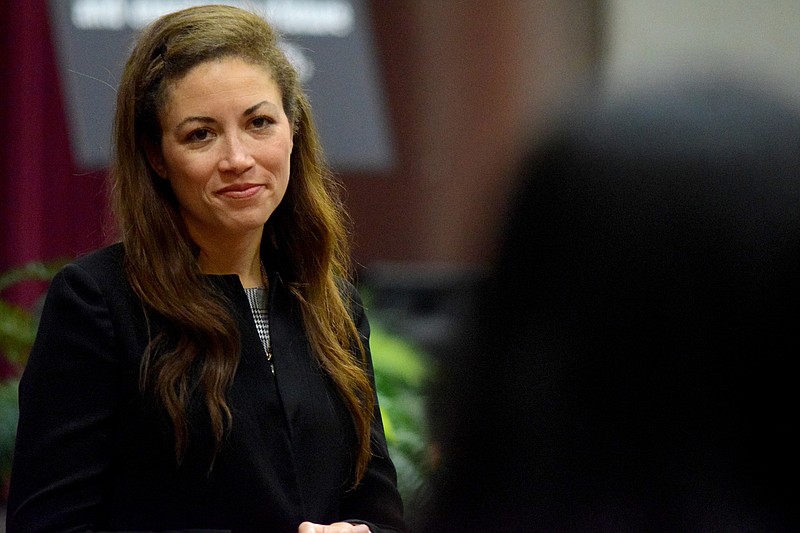This story was originally published by Chalkbeat. Sign up for their newsletters at ckbe.at/newsletters.
Tennessee has bolstered the financial penalties against large school districts that violate the state's new law regulating discussions on race and gender in the classroom.
The state also lengthened the amount of time allowed for filing a complaint against a teacher who has allegedly crossed the line, while it stuck with plans to accept complaints only from students, parents or staff in the affected district or charter school.
Education Commissioner Penny Schwinn signed off recently on emergency rules for regulating the teaching of prohibited topics under a law enacted this spring amid national fury from conservatives about critical race theory, an academic framework that examines how policies and laws may perpetuate systemic racism.
It's unclear how many complaints will be filed in Tennessee under the new rules, since critical race theory is taught mostly in higher education - not K-12 schools.
The law restricts teachers from discussing 14 concepts the legislature deemed cynical or divisive. Among the concepts are that the United States is fundamentally or irredeemably sexist or racist and that an individual is inherently privileged, racist, sexist or oppressive because of race or gender.
Schwinn promised the guidance after Gov. Bill Lee signed the law, one of dozens of state-level actions nationwide seeking to prevent educators from using critical race theory concepts and The New York Times' 1619 Project on U.S. history.
The emergency rules, which became effective Nov. 8, will remain in place until May 7, when the department plans to have final rules based on lessons learned about enforcing the law this school year.
The rules nail down processes for filing and investigating complaints, appealing decisions and levying punishment. Schwinn approved the package after her department reviewed more than 900 public comments and tweaked its proposed enforcement plan released in late July.
"Most revisions were made in response to feedback received during the public comment period, but some revisions were made to clarify misunderstandings or confusion of wording in the original draft," said department spokesman Brian Blackley on Friday.
Some of the commenters complained proposed penalties were excessive, both for teachers and districts deemed out of compliance.
But while the rule's wording removed "licensure action" from the language about teacher penalties, it still allows the State Board of Education to suspend or revoke licenses after local districts take initial disciplinary action that could include firing a teacher. That's partly because Tennessee's Teacher Code of Conduct, which is also in state law, requires educators to "abide by all applicable federal and state laws."
Financial penalties for districts, particularly larger ones, will be higher than under the draft rules. They'll be based on a district or charter school's percentage of annual state funds - 2% on the first offense, growing to 10% by the fifth offense - instead of allowing a lesser flat fee that starts at $1 million.
Rep. Scott Cepicky, a Maury County Republican who was instrumental in the law's passage, had argued larger districts could afford the flat penalty, while forgoing a percentage of state funds would sting more.
Hundreds of commenters, especially from Williamson County - which has significant political influence in state government - asked the department to expand the definition of "eligible complainant" to include grandparents of students or even taxpayers in general. But others worried that "outside forces" who don't have children in public schools could file unfounded complaints that will waste administrators' time.
In the end, the state stuck with restricting eligibility to current students, parents or employees. However, it yielded to calls for a longer window of time to file a complaint: 45 calendar days instead of the proposed 30 days from the alleged violation.
The rules place the responsibility for investigating complaints about teachers on local school systems and charter schools that "are best positioned to choose which textbooks and instructional materials meet the needs of their students, educators and community."
After receiving a complaint, administrators have 60 calendar days to substantiate it and take action to ensure the prohibited concept is no longer included in instruction, curriculum or related materials. But administrators are also encouraged to work with parents, teachers, and other staff to reach an "early resolution of complaints" that halts the process.
The state education department will handle appeals and step in if a district or charter school drops the ball in the process or knowingly violates the new law.
Many Tennesseans both for and against the law complained the prohibited concepts are vague, but the rules don't delve into those questions.
None of the legislature's Democrats supported the Republican-backed measure, which received vocal support from the political action group Moms for Liberty. Many other organizations, including the ACLU of Tennessee and the Organization of American Historians, the nation's largest professional organization of U.S. history scholars, voiced opposition.
Chalkbeat is a nonprofit news site covering educational change in public schools.
